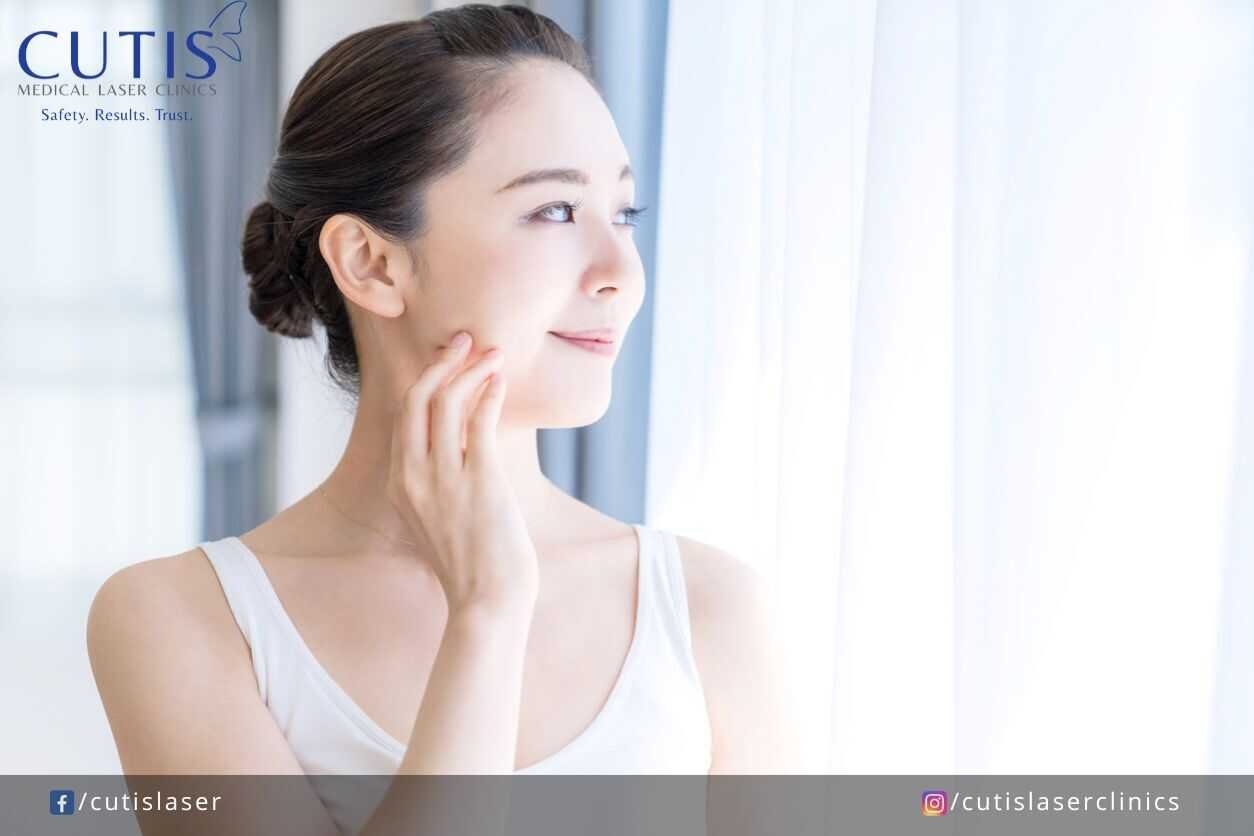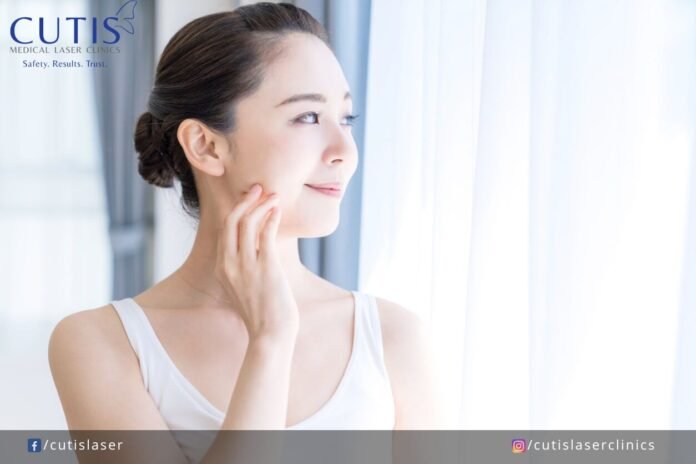3 Key Takeaways:
- Daytime skincare should be sun-smart
Choose ingredients that support your skin under the sun, like hyaluronic acid and Vitamin C. They hydrate and protect without increasing sensitivity to UV rays.
- Some ingredients don’t mix with sunlight
Skip retinol, exfoliating acids (AHAs/BHAs), benzoyl peroxide, and certain fragrances during the day. They can cause irritation, burns, or pigmentation when exposed to UV.
- Sunscreen isn’t optional, it’s essential
Even with sun-safe ingredients, broad-spectrum sunscreen with SPF 30+ is a must. Apply it last in your routine and reapply every 2–3 hours if you’re spending time outdoors.

Your skincare regimen shouldn’t just depend on your skin type. While it does matter, you should also consider the time of day and sunlight exposure. This is because certain ingredients work well under the sun, while others can cause irritation, sensitivity, and damage when exposed to UV rays.
Continue reading as our aesthetic clinic in Singapore lists down which ingredients are sun-safe and which are best used at night. Plus, we answer common questions like: Can I wear hyaluronic acid in the sun?Does Vitamin C make your skin more sensitive to the sun?
INGREDIENTS YOU CAN USE IN THE SUN
Sun-safe ingredients are considered non-photosensitive, meaning they won’t make your skin more vulnerable to UV damage. In fact, certain ingredients provide additional protection or support skin health during sun exposure.
Does it increase sun sensitivity?
No. Hyaluronic acid (HA) is a hydration booster that’s safe for daytime use. It draws moisture into the skin, helping to keep it plump and protected. HA can act as a protective barrier and shield the skin from damage caused by external aggressors.
Should you wear it in the sun?
Yes. Just remember that it doesn’t offer sun protection itself. Know that it is vulnerable to UV damage, which means it can break down under sunlight. So, make sure to layer it under a broad-spectrum sunscreen.
Try:Hydra Pro with MoistureLock Complex – This lightweight, non-greasy moisturizer is infused with hyaluronic acid and zinc to hydrate and calm sensitive skin. It can be used as a part of your daily skincare routine or glide for skin needling procedures.
Is Vitamin C safe under the sun?
Yes, and it can actually be beneficial during the day. Vitamin C helps neutralize free radicals caused by UV exposure, reducing oxidative stress and preventing visible signs of aging.
Does it make your skin more sensitive to the sun?
No, but it is photosensitive in the bottle, meaning it can degrade when exposed to light. Always store Vitamin C products properly, and apply them before sunscreen in your morning routine.
Try:Dr. Sylvia’s 20% Vitamin C with Ferulic Acid – This antioxidant formula protects against UV and environmental damage while promoting brighter, firmer skin. It can potentially improve signs of aging such as fine lines, wrinkles, and dark spots.
INGREDIENTS TO AVOID IN THE SUN
Certain ingredients can make your skin more photosensitive, which means increased risk of irritation, inflammation, or pigmentation when exposed to sunlight. These are best reserved for your evening routine.
Should you use retinol during the day?
The general recommendation is to skip standard retinol during the day. Retinoids (including Retin-A, tretinoin, and over-the-counter retinol) increase skin sensitivity to UV rays, making you more at risk of burns and damage.
Safe alternatives for daytime:
- Vitamin C – antioxidant and collagen-boosting
- Peptides – firm and smooth without irritation
- Niacinamide – calms and strengthens the skin barrier
- Bakuchiol – offers similar anti-aging benefits, but is much gentler on the skin
- Salicylic Acid and Exfoliating Acids (AHAs/BHAs)
Why are exfoliating acids risky in the sun?
Salicylic acid, along with alpha hydroxy acids (AHAs) like glycolic and lactic acids, promotes exfoliation and cell turnover. They are great for acne and dull skin, but they can also make the skin more prone to sunburn.
Exfoliating acids work by increasing skin cell turnover, which thins the outer layer of the skin and reduces natural sun protection. This makes you more susceptible to burns, redness, and irritation.
How to use them safely:
- Apply at night
- Use SPF 50 daily
- Reapply sunscreen every 2–3 hours (especially if sweating or swimming)
Tip: If you have sensitive or reactive skin, consider skipping exfoliating acids entirely during high-sun exposure days.
Does benzoyl peroxide increase sun sensitivity?
Yes. Benzoyl peroxide increases photosensitivity, meaning your skin is more likely to burn, blister, or swell when exposed to sunlight. It can also lead to hyperpigmentation, especially in those with deeper skin tones.
Should you wear it in the sun?
No. Benzoyl peroxide is best used at night. In addition to making your skin more vulnerable to UV damage, recent studies show it can degrade in sunlight and heat, producing benzene, a known carcinogen.
Tip: If you do use benzoyl peroxide, avoid sunbeds, refrigerate the product when possible, and always apply a broad-spectrum SPF 30+ during the day, even if used the night before.
Photosensitive Fragrances
Some common fragrance ingredients, like musk, bergamot, and lavender oil, can trigger photoallergic reactions. They can potentially lead to rashes or discoloration when exposed to sunlight.
Tip: Choose fragrance-free skincare or products labeled non-photosensitizing. And if you have sensitive skin or are prone to allergies or irritation, fragrance-free formulas are the safer choice.
When should you apply sunscreen?
Sunscreen should be the last step of your morning skincare routine, after your serums and moisturizers, but before any makeup.
Daytime routine order:
- Cleanser
- Toner (if used)
- Treatment serums (e.g., Vitamin C, hyaluronic acid)
- Moisturizer
- Broad-spectrum sunscreen with SPF 30 or higher. (Make sure to reapply every 2–3 hours during prolonged sun exposure).
- Makeup (optional)
Ready to build a sun-safe routine?
Solid skincare isn’t only about what products you use, but also when and how you use them. During the day, stick to hydrating and protective ingredients like hyaluronic acid and Vitamin C, and avoid exfoliants that can make skin susceptible to UV damage.
Browse Dr. Sylvia Skin Care for products designed to hydrate, protect, and glow, even under the summer sun. And for skin issues brought on by sun damage, don’t hesitate to schedule a consultation with one of our aesthetic doctors in Singapore.
To share, click on the Icon.
